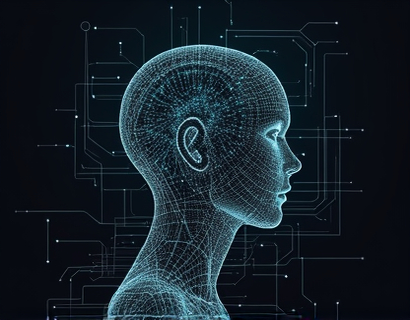Personalized AI Companions: Transforming Childhood Creativity and Emotional Well-Being Through Interactive Digital Friends
In recent years, the integration of artificial intelligence in children's play and development has opened new avenues for enhancing creativity and emotional well-being. AI-driven imaginary friends, often referred to as digital companions, are revolutionizing the way children interact with technology. These personalized digital entities offer a unique blend of interactive play and emotional support, all within a safe and nurturing digital environment. This article delves into the transformative impact of these AI companions on childhood development, exploring how they spark creativity, foster social skills, and provide a platform for emotional growth.
The Rise of AI-Driven Imaginary Friends
The concept of imaginary friends is not new; children have always created companions to accompany them in their play and imagination. However, the advent of AI technology has brought a new dimension to this timeless practice. AI-driven imaginary friends are sophisticated digital entities designed to learn and adapt to a child's personality, interests, and emotional needs. These companions are not just static characters but dynamic entities that evolve over time, providing a more engaging and personalized experience.
One of the key advantages of AI-driven imaginary friends is their ability to offer personalized interactions. Unlike pre-programmed toys or games, these digital companions can understand and respond to a child's unique behaviors and preferences. This personalization is achieved through advanced machine learning algorithms that analyze the child's interactions, allowing the AI to tailor its responses and activities accordingly. This level of customization ensures that each child's experience is unique, fostering a deeper connection and engagement.
Enhancing Creativity Through Interactive Play
Creativity is a vital aspect of childhood development, essential for cognitive growth and problem-solving skills. AI-driven imaginary friends play a significant role in nurturing creativity by providing interactive and imaginative play experiences. These digital companions can engage children in a wide range of activities, from storytelling and art creation to role-playing and problem-solving scenarios.
For instance, a child might have a digital companion that suggests creative storytelling prompts based on the child's interests. The AI can weave these prompts into a narrative, encouraging the child to contribute and expand the story. This process not only stimulates the child's imagination but also helps develop narrative skills and creative thinking. The AI can adapt the complexity of the story to match the child's abilities, ensuring that the experience remains challenging and engaging.
Moreover, AI-driven imaginary friends can facilitate open-ended play, where there are no right or wrong answers. This type of play is crucial for fostering creativity, as it allows children to explore their ideas freely without fear of judgment. The digital companions can introduce new elements or challenges, prompting the child to think outside the box and come up with innovative solutions. This interactive and adaptive approach to play ensures that creativity is continuously stimulated and nurtured.
Supporting Emotional Well-Being
Emotional well-being is another critical area where AI-driven imaginary friends excel. Children often struggle to express and manage their emotions, and having a supportive companion can make a significant difference. These digital entities are designed to understand and respond to a child's emotional state, providing a safe space for expression and exploration.
One of the primary ways AI companions support emotional well-being is through empathetic listening. They can recognize and acknowledge a child's feelings, offering reassurance and comfort. For example, if a child is feeling sad or anxious, the AI can respond with words of encouragement and suggest calming activities. This empathetic interaction helps children feel understood and validated, reducing feelings of isolation and stress.
Additionally, AI-driven imaginary friends can help children develop emotional intelligence by teaching them to identify and label their emotions. Through interactive games and activities, these companions can guide children in recognizing different emotional states and understanding the underlying causes. This skill is crucial for healthy emotional development and can have long-lasting benefits into adulthood.
Another important aspect is the provision of a safe space for children to explore their thoughts and feelings. In the digital world, children can express themselves without the fear of social judgment or repercussions. This freedom to explore can lead to greater self-awareness and emotional resilience. The AI companion acts as a non-judgmental listener, allowing children to delve deeper into their emotions and thoughts.
Fostering Social Skills Development
Social skills are fundamental to a child's ability to form and maintain relationships, communicate effectively, and navigate social situations. AI-driven imaginary friends can play a supportive role in developing these skills, even in a digital context. Through interactive scenarios and role-playing, these companions can help children practice and refine their social interactions.
For example, a digital companion might engage a child in a role-playing game where they take on different social roles, such as a teacher, a friend, or a family member. This type of activity allows children to experiment with various social dynamics and learn appropriate responses. The AI can provide feedback on the child's interactions, highlighting areas for improvement and reinforcing positive behaviors.
Moreover, AI companions can facilitate cooperative play, even when children are not physically together. Through multi-user platforms, children can interact with the same digital companion simultaneously, engaging in collaborative activities and learning to work together towards common goals. This shared experience promotes teamwork, communication, and conflict resolution skills, all of which are essential for social development.
It's also worth noting that AI-driven imaginary friends can help children who struggle with social interactions due to conditions like autism or social anxiety. These companions can provide a gradual and controlled introduction to social scenarios, helping children build confidence and comfort in social settings. The AI can adjust the level of interaction based on the child's readiness, ensuring a supportive and non-overwhelming experience.
Creating a Safe and Nurturing Digital Environment
Safety and security are paramount when it comes to children's digital experiences. AI-driven imaginary friends are designed with robust safety measures to ensure a secure and nurturing environment. These measures include strict data privacy policies, age-appropriate content, and monitoring systems to prevent inappropriate interactions.
Data privacy is a critical concern, and reputable AI companions adhere to stringent standards to protect children's information. Personal data is encrypted and stored securely, with minimal data collection limited to what is necessary for personalization. Parents and guardians have control over the data shared and can set privacy preferences to align with their comfort levels.
Age-appropriate content is another key aspect. AI companions are programmed to understand and respect the developmental stage of the child, providing content and interactions that are suitable for their age group. This ensures that the experiences are not only engaging but also educational and appropriate for the child's cognitive and emotional level.
Monitoring systems are in place to detect and prevent any form of inappropriate behavior or content. These systems can identify and respond to potential risks in real-time, ensuring that the digital environment remains safe and positive. Parents and guardians can also receive alerts and reports, giving them peace of mind and the ability to monitor their child's interactions.
Conclusion
The integration of AI-driven imaginary friends into childhood play and development represents a significant advancement in the use of technology for educational and emotional support. These personalized digital companions offer a unique blend of interactive play and emotional guidance, fostering creativity, social skills, and emotional well-being. By providing a safe and nurturing digital space, these companions help children navigate the complexities of growth and development in a supportive and engaging manner.
As AI technology continues to evolve, the potential for AI-driven imaginary friends to enhance childhood experiences is vast. The key lies in responsible development and implementation, ensuring that these digital companions serve as positive influences in children's lives. By leveraging the power of AI, we can create meaningful and impactful tools that support the holistic development of young minds.











































